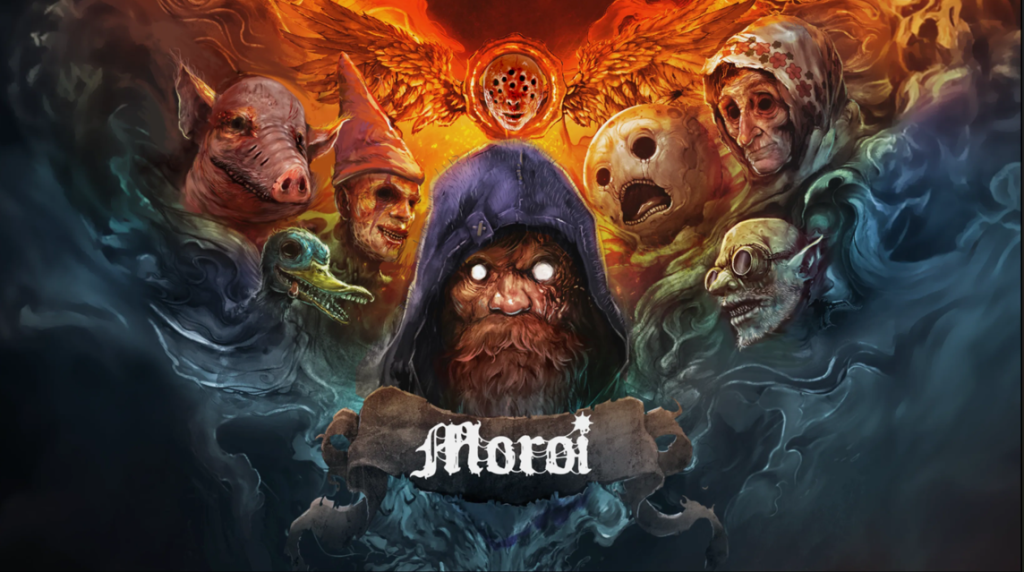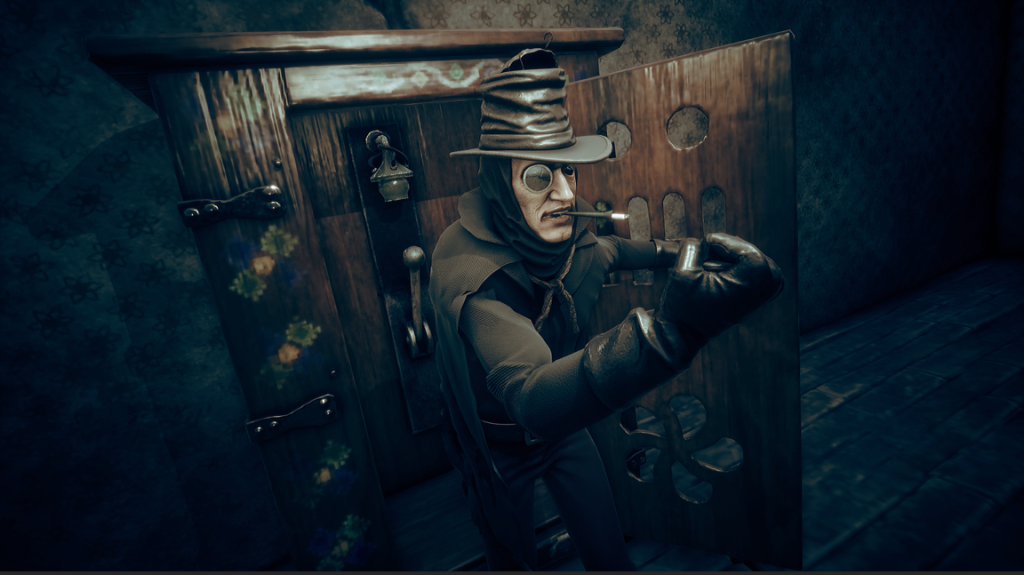Moroi, developed by Violet Saint and published by Good Shepherd Entertainment, is a dark fantasy hack-and-slash adventure that draws deeply from Romanian folklore, Lynchian surrealism, and heavy metal aesthetics. Released on Steam for PC at £12.99, Moroi stands out for its grimdark atmosphere, twisted humor, and a narrative that pulls players into a personalized hellscape known as the Cosmic Engine.

A World Forged in Darkness and Surrealism
The setting of Moroi is a labyrinthine, nightmarish realm filled with rusted gears, rotting flesh, and corridors that seem to twist reality itself. The game’s art direction is immediately striking, immersing players in a world that feels both oppressive and alive. The environments are meticulously crafted, with each area exuding a sense of dread and decay that is amplified by macabre visual details and a heavy metal soundtrack that intensifies during combat. The influence of David Lynch is evident throughout, with bizarre characters and unsettling scenarios that evoke a constant sense of unease.
The protagonist awakens with no memory of their name, sins, or past, forced to claw their way through a theater of torment. The narrative is intentionally cryptic, unraveling only as players interact with the world and its grotesque inhabitants. The sense of mystery is heightened by the game’s commitment to grimdark fantasy-a subgenre defined by bleak, dystopian settings and morally ambiguous characters.
Combat: Brutal, Unorthodox, and Satisfyingly Chaotic
Moroi’s combat system is a blend of melee and ranged action, reminiscent of classic hack-and-slash titles but with its own surreal twist. Players can wield an array of unconventional weapons, such as a sword enhanced with the teeth of a talking duck or a headpiece that fires lasers. The arsenal is highly customizable, allowing for weapon crafting and leveling, with each weapon offering distinct visual and gameplay effects.
Combat encounters are varied and often challenging, featuring battalions of mages, golden guards, and the cursed dead. The game employs a top-down perspective, and while some reviewers noted the movement can feel floaty, the action is fluid and engaging when it clicks. Executions are particularly satisfying, with a meter that fills up to allow for bloody finishing moves. Environmental hazards and unique boss mechanics, such as disabling shield generators or sneaking past laser-equipped robots, keep the gameplay fresh and unpredictable.
However, the combat is not without its flaws. Some players have reported issues with dodging and animation locks, which can make certain encounters feel more reliant on luck than skill. Despite these quirks, the overall experience remains intense and rewarding, especially for those who appreciate a challenge.

Puzzles, Secrets, and Eccentric Characters
Beyond combat, Moroi offers a wealth of puzzles and secrets that demand both logic and a willingness to embrace the bizarre. Progression often requires players to perform grotesque tasks-drinking blood to open doors, inducing regurgitation to reveal new paths, or digging through viscera for keys. Each solution feels like a sacrifice, reinforcing the game’s themes of suffering and perseverance.
The cast of characters in Moroi is one of its strongest aspects. Dialogues are laced with morbid humor, providing moments of levity amid the darkness. Interactions with eccentric NPCs not only advance the story but also deepen the player’s connection to the world. Personally, I found myself drawn into the narrative by these characters-their wit and peculiarities made me eager to uncover the next twist or secret. With every encounter, I learned more about my character, yet new mysteries always emerged, pulling me deeper into the story.
The game’s dialogue and story elements are as important as the combat, with many secrets and puzzles to uncover throughout the journey. The sense of discovery is constant, and the narrative’s twists and turns kept me invested from start to finish.
Technical Details and Replayability
Moroi is built in Unreal Engine 4 and features a top-down isometric perspective. The game is relatively concise, offering a playtime of 6-8 hours, but it encourages multiple playthroughs with its branching narrative and multiple endings. Choices made throughout the game significantly impact the outcome, ensuring that each run feels unique and meaningful.
Weapon crafting is a core feature, allowing players to mix and match components for different effects. The game also includes difficulty settings to cater to a range of players, from those seeking a narrative experience to those who enjoy a tougher challenge.
While Moroi is an impressive debut for Violet Saint, it is not without technical issues. Some bugs in player movement have been noted, but the development team is aware and actively working on fixes for upcoming updates. This responsiveness from the developers gives me confidence that the experience will only improve over time.

Atmosphere, Sound, and Artistic Vision
The atmosphere in Moroi is nothing short of captivating. The heavy metal soundtrack ramps up during combat, delivering a DOOM-like intensity, while ambient tracks heighten the game’s unsettling mood during exploration. The visual style is a blend of grotesque and surreal, with each character and environment meticulously designed to fit the game’s dark fairytale aesthetic.
The narrative, inspired by Romanian folklore, adds an extra layer of depth. The concept of the “Moroi” as a vampire or ghost is woven into the protagonist’s journey, echoing the myth of Greuceanu, a hero tasked with restoring light to the world. These folklore elements enrich the story, making it both unique and culturally resonant.
Personal Experience and Final Thoughts
Playing Moroi was a journey into the unknown-a constant push and pull between revelation and mystery. The characters and their dialogues were standout features for me, making each interaction memorable and meaningful. At every stage, I felt I was learning more about my character, yet new gaps in understanding would appear, keeping me hooked without ever feeling lost. The overarching story, with its twists and turns, drew me deeper into the world, making the experience both rewarding and thought-provoking.
Despite some rough edges in combat and movement, Moroi’s strengths far outweigh its weaknesses. The development team’s commitment to addressing bugs is reassuring, and I believe future updates will smooth out the remaining issues.
Conclusion
Moroi is a bold, surreal hack-and-slash adventure that carves its own path through the genre. With its unique blend of grimdark fantasy, Romanian folklore, and Lynchian weirdness, it offers an experience that is as unsettling as it is captivating. The combination of brutal combat, challenging puzzles, and eccentric characters ensures that every moment is engaging, while the branching narrative and multiple endings provide substantial replay value. For those willing to embrace its madness, Moroi is a journey worth taking-a twisted fairytale that lingers long after the final credits roll.